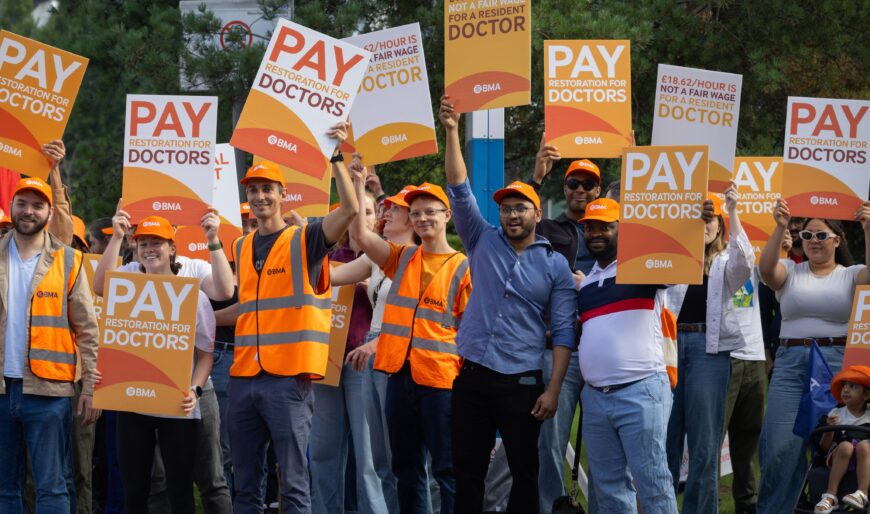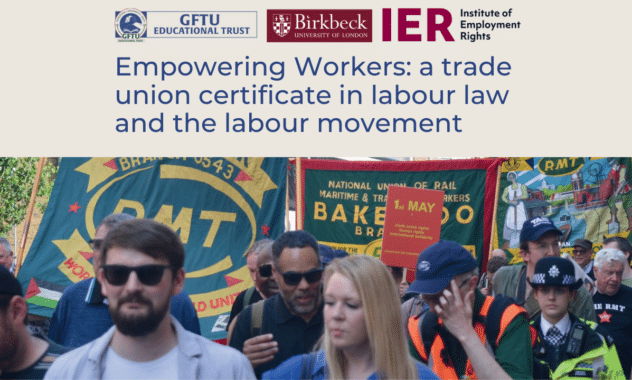Conservatives would ban NHS Doctors from striking
Leader of the Opposition, Kemi Badenoch, says she would reinstate minimum service levels and strip Doctors of the right to strike

Over the weekend the Conservative Party announced a new policy that would see NHS Doctors stripped of their ability to take industrial action and their fundamental right to strike.
Despite overseeing a period of increased industrial action across a range industries, plunging the NHS into a number of protracted pay disputes with Resident Doctors, Consultants, Nurses, Paramedics and other workers in the NHS, the Conservative Party has launched this policy arguing that the current Resident Doctors strikes are happening because ‘Labour are too weak to stand up to the unions’.
Leader of the Conservative Party, Kemi Badenoch, announced the following 3-point action plan:
- Introduce Minimum Service Levels across the health service.
- Legislate to stop doctors from taking widespread strike action – like police officers and soldiers.
- Make an offer in the national interest to work with the Government to face down the BMA, to help protect patients and the NHS.
The first point of action, reinstating Minimum Service Levels, likely refers to reinstating the Minimum Service Levels Act, with an amendment to bring more workers in healthcare under its scope. Despite criticism from a host of parliamentary committees, and despite resistance from the House of Lords, the MSL Act was passed by the previous Government but never fully implemented and put into practice.
When we compare how ‘minimum service levels’ are set in other European countries, evidence suggests that they are set either though negotiations between unions and employers or through judicial decisions. For example, in Ireland, arrangements to provide a minimum level of service in essential services is based on voluntary agreements between unions and employers rather than the law. Both sides are encouraged to reach these agreements but not compelled to do so. In France, the administrative court has ruled that during a strike of hospital staff, the hospital must provide minimum services, set at a level which will avoid ‘serious risks’- the precise level of service to be provided is subject to negotiation between the management of each hospital and the unions.
This anti-strike policy from the Conservative Party came in the midst of the Resident Doctors Strike announced by the BMA, which took place between the 25th-29th of July. When Doctors do go on strike, the BMA updates critical guidance for consultants and SAS doctors who work with employers to ensure that services are still able to operate effectively. Additionally, safety-critical derogation systems are applied during strike actions whereby the employers are able to make emergency requests to the Union for striking doctors to return to work where patient safety is at risk.
The mythology behind the claim that unions don’t offer minimum staffing behind the NHS is a cynical attempt to violate Doctors’ right to strike, a right established by many international treaties which the UK has ratified.
In the UK, the only people legally prohibited from going on strike are members of the police force and non-civilian members of the armed forces. Prison officers were also controversially and unfairly banned from taking any form of industrial action through the Criminal Justice and Public Order Act 1994, under a contrived parallel with the ‘powers’ and ‘authority’ enjoyed by police constables. The POA has raised the alarm on ministers taking full advantage of this unfair industrial power imbalance by slashing pay, terms and conditions while knowing there’s very little that prison officers could do about it. Last year (2024), the ECHR finally accepted an application from the POA on these restrictions, giving the union some possibility of progress on this issue after thirty years of disputes with the Government, onerous fines and a permanent injunction. Doctors have the same right to strike as any other employee in the public or private sector. Removal of this right would be a similarly fraught and disproportionate measure, making the UK an outlier on this issue while likely placing it in violation of its international obligations by imposing such severe restrictions
Dr Tom Dolphin, BMA chair, called Badenoch’s proposal “a desperate intervention from a Conservative Party that spent nearly 15 years failing the NHS”.
He continued that industrial action was a last resort and that the right to strike should always be there- “Threatening to ban strike action is not the right response for a modern democracy.”







